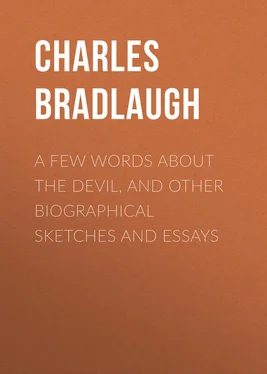Charles Bradlaugh - A Few Words About the Devil, and Other Biographical Sketches and Essays
Здесь есть возможность читать онлайн «Charles Bradlaugh - A Few Words About the Devil, and Other Biographical Sketches and Essays» — ознакомительный отрывок электронной книги совершенно бесплатно, а после прочтения отрывка купить полную версию. В некоторых случаях можно слушать аудио, скачать через торрент в формате fb2 и присутствует краткое содержание. Жанр: foreign_prose, на английском языке. Описание произведения, (предисловие) а так же отзывы посетителей доступны на портале библиотеки ЛибКат.
- Название:A Few Words About the Devil, and Other Biographical Sketches and Essays
- Автор:
- Жанр:
- Год:неизвестен
- ISBN:нет данных
- Рейтинг книги:5 / 5. Голосов: 1
-
Избранное:Добавить в избранное
- Отзывы:
-
Ваша оценка:
- 100
- 1
- 2
- 3
- 4
- 5
A Few Words About the Devil, and Other Biographical Sketches and Essays: краткое содержание, описание и аннотация
Предлагаем к чтению аннотацию, описание, краткое содержание или предисловие (зависит от того, что написал сам автор книги «A Few Words About the Devil, and Other Biographical Sketches and Essays»). Если вы не нашли необходимую информацию о книге — напишите в комментариях, мы постараемся отыскать её.
A Few Words About the Devil, and Other Biographical Sketches and Essays — читать онлайн ознакомительный отрывок
Ниже представлен текст книги, разбитый по страницам. Система сохранения места последней прочитанной страницы, позволяет с удобством читать онлайн бесплатно книгу «A Few Words About the Devil, and Other Biographical Sketches and Essays», без необходимости каждый раз заново искать на чём Вы остановились. Поставьте закладку, и сможете в любой момент перейти на страницу, на которой закончили чтение.
Интервал:
Закладка:
It has always been my ambition to enter Parliament, and at the General Election for 1808 I, for the first time, entered the arena as a candidate. I was beaten; but this is scarcely wonderful. I had all the journals in England except three against me. Every idle or virulent tale which folly could distort or calumny invent was used against me. Despite all, I polled nearly 1,100 votes, and I obtained unasked, but not ungratefully listened to, the public acknowledgments from the Mayor of the borough, also from one of my competitors, Mr. Charles Gilpin, as to the loyal manner in which I had fought the contest through.
During the election struggle libels rained from all sides. One by the late Mr Capper, M. P., seeking reelection at Sandwich, was the monstrous story, that in the open square at Northampton I had taken out my watch and defied God to show his power by striking me dead in five minutes. Challenged for his authority Mr. Capper pretended to have heard the story from Mr. C. Gilpin, M. P., who indignantly denied being any party to the falsehood. I insisted on an apology from Mr. Capper, which being refused I sued him, but he died soon after the writ was served. The story was not an original invention by Mr. Capper; it had been reported of Abner Kneeland thirty years before, and is still a favorite one with pious missionaries at street corners. A still more outrageous slander was inserted in the Razor , a pseudo-comic weekly. I compelled this journal to give a full apology, but not until after two years' litigation, and a new trial had been ordered. When obliged to recant, the Christian proprietor became insolvent, to avoid payment of the costs. Unfortunately born poor, my life had been one continued struggle, and the burden of my indebtedness was sorely swollen in this and similar contests.
Probably the most severe, and to me certainly the most costly, struggle has been on the oath question. Formerly it was a fatal objection against the competency of a witness who did not believe in a Deity and in a future state of rewards and punishments. Several attempts had been made to alter the law, but they had all failed; and indeed Sir J. Trevelyan's measures only provided for affirmation, and did not seek to abolish the incompetency. In a case in which I was plaintiff in the Court of Common Pleas, my evidence was objected to, and I determined to fight the matter through every possible court, and to get the law changed if possible.
I personally argued the case before Lord Chief Justice Bovill and a full Bench, in the Court of Common Pleas, and with the aid of the present Mr. Justice Denman and the late Lord Chancellor Hatherly, the law was twice altered in Parliament. Before victory was ultimately obtained I had to carry the case into the Court of Error, and I prepared and sent out at my own cost more than two hundred petitions to Parliament. Ultimately the Evidence Amendment Act, 1869, and the Evidence Further Amendment Act, 1870, gave Freethinkers the right to enter the witness box, and I won my suit. The Christian defendant finished by becoming bankrupt, and I lost a terribly large sum in debt and costs. The original debt and interest were over £300, and the costs of the various proceedings were very heavy.
In the winter of 1870 the Mirfield Town Hall, which had been properly taken and paid for for two nights' lectures, was refused by the proprietors, who barricaded the hall, and obtained a great force of police from the neighborhood. In order that the law might be clearly settled on this matter, I brought an action to try the question, and although the late Mr. Justice Willis expressed himself strongly in my favor, it was held by Mr. Justice Mellor at nisi prius that nothing, except a deed under seal or an actual demise, would avail. A mere agreement for a user of a hall was a license revocable at will, even when for a valuable consideration. This convinced me that when hall proprietors break their contracts, I must enforce my rights as I did at Huddersfield, and have done in other places.
During the Franco-Prussian struggle I remained neutral until the 4th of September. I was against Bismark and his blood-and-iron theory, but I was also against the Empire and the Emperor; so I took no part with either. I was lecturing at Plymouth the day the decheance was proclaimed, and immediately after wrote my first article in favor of Republican France. I now set to work and organized a series of meetings in London and the provinces, some of which were cooperated in by Dr. Congreve, Professor Beesly, and other prominent members of the Positivist party. These meetings exercised some little effect on the public opinion in this country, but unfortunately the collapse on the part of France was so complete, and the resources commanded by Bismark and Moltke so vast, that, except as expressing sympathy, the results were barren. In October, 1870, I, without any previous communication from myself to them, received from the Republican Government at Tours a long and flattering letter, signed by Leon Gambetta, Adolphe Cremieux, Al Glais Bizoin, and Admiral Fourichon, declaring that they, as members of the "Gouvernement de la Defense Nationale, reunis en delegation a Tours," "tiennent a honneur de vous remercier chalereusement du noble concours que vous apportez a la cause de la France." On the 2d of February, 1871, M. Tissot, the Charge d'Affaires of France in England, wrote me: "Quant a moi, mon cher ami, le ne puis que constater ici, comme je l'ai deja fait, comme je le feraien toute occasion, la dette que nous avons contracted envers vous. Vous nous avez donne votre temps, votre activite, votre eloquence, votre ame, la meilleure partie de vous meme, en un mot; la France que vous avez ete seule a defendre ne l'oubliera jamais." This is probably a too flattering estimate of my services to France, but coming from the official representative of the French Republic, I feel entitled to insert it. In September, 1871, Monsieur Emmanuel Arago, member of the Provisional Government of the 4th of September, wrote the following words upon the letter which had been sent me, as above mentioned, in October, 1870, by the Delegate Government of Tours: "En lisant cette lettre, j'eprouve tres vivement le regret de n'avoir pu, en-ferme dans Paris, joindre ma signature a celles de mes collegues de la delegation de Tours. Mr. Bradlaugh est et sera toujours dans la Republique notre concitoyen."
During 1870, 1871, and 1872, 1 held several debates with the Rev. A. J. Harrison, formerly of Huddersfield. The first at Newcastle, in the splendid Town Hall of that place, was attended by about 5,000 persons. The second debate at Bristol, was notable from being presided over by Professor Newman. The third discussion was at Birmingham, and was an attempt at the Socratic method, and the last platform encounter, was in the New Hall of Science, London. Of the Rev. Mr. Harrison it is enough I should say that, a few weeks since, when rumor put my life in danger, he was one of the first to write a kindly and unaffected letter of sympathy to Mrs. Bradlaugh.
When the great cry of thanksgiving was raised for the recovery of the Prince of Wales, I could not let it pass without protest. While he lay dangerously ill I had ceased to make any attack on himself or family, but I made no pretense of a grief I did not feel. When the thanksgiving day was fixed, and tickets for St. Paul's were sent by the Lord Chamberlain to working men representatives, I felt it right to hold a meeting of protest, which was attended by a crowded audience in the New Hall of Science.
The "right of meeting" has given me three important occasions of measuring swords with the Government during the last few years, and each time defeat has attended the Government. The first, the Hyde Park meeting, where I acted in accord with Mr. Beales, to whom as chief, let the honor go of this conflict. The second was on the 31st July, 1871, under the following circumstances. A meeting had been held by Mr. G. Odger and some of his friends in Hyde Park, on Sunday the 30th of July, to protest against the grant to Prince Arthur; this meeting was adjourned until the following evening. Late on the Sunday afternoon, the adjourned meeting was forbidden by the Government. Early on Monday morning Mr. Odger applied to me to give the friends the benefit of my legal knowledge and personal influence. I consented, and the Government persevering, I took my share of the responsibility of the gathering, and signed with Mr. Odger a new notice convening the meeting. The Home Office not only served us also with a written prohibition, but threatened and prepared to use force. I immediately gave Mr. Bruce notice that the force would be illegal, and that it would be resisted. At the last moment, and in fact only some half hour before the meeting commenced, the Government abandoned its prohibition, and an enormous meeting of a most orderly character was held in absolute defiance of the authorities.
Читать дальшеИнтервал:
Закладка:
Похожие книги на «A Few Words About the Devil, and Other Biographical Sketches and Essays»
Представляем Вашему вниманию похожие книги на «A Few Words About the Devil, and Other Biographical Sketches and Essays» списком для выбора. Мы отобрали схожую по названию и смыслу литературу в надежде предоставить читателям больше вариантов отыскать новые, интересные, ещё непрочитанные произведения.
Обсуждение, отзывы о книге «A Few Words About the Devil, and Other Biographical Sketches and Essays» и просто собственные мнения читателей. Оставьте ваши комментарии, напишите, что Вы думаете о произведении, его смысле или главных героях. Укажите что конкретно понравилось, а что нет, и почему Вы так считаете.












